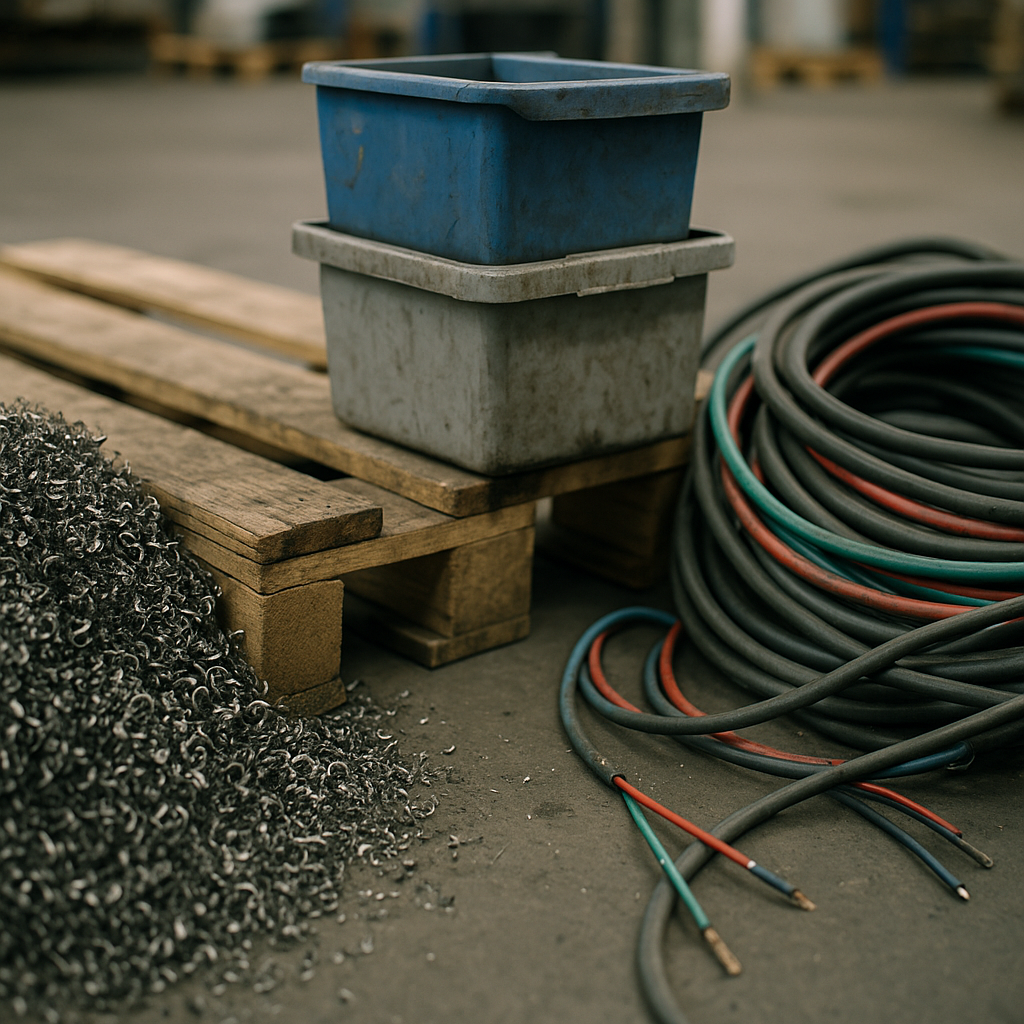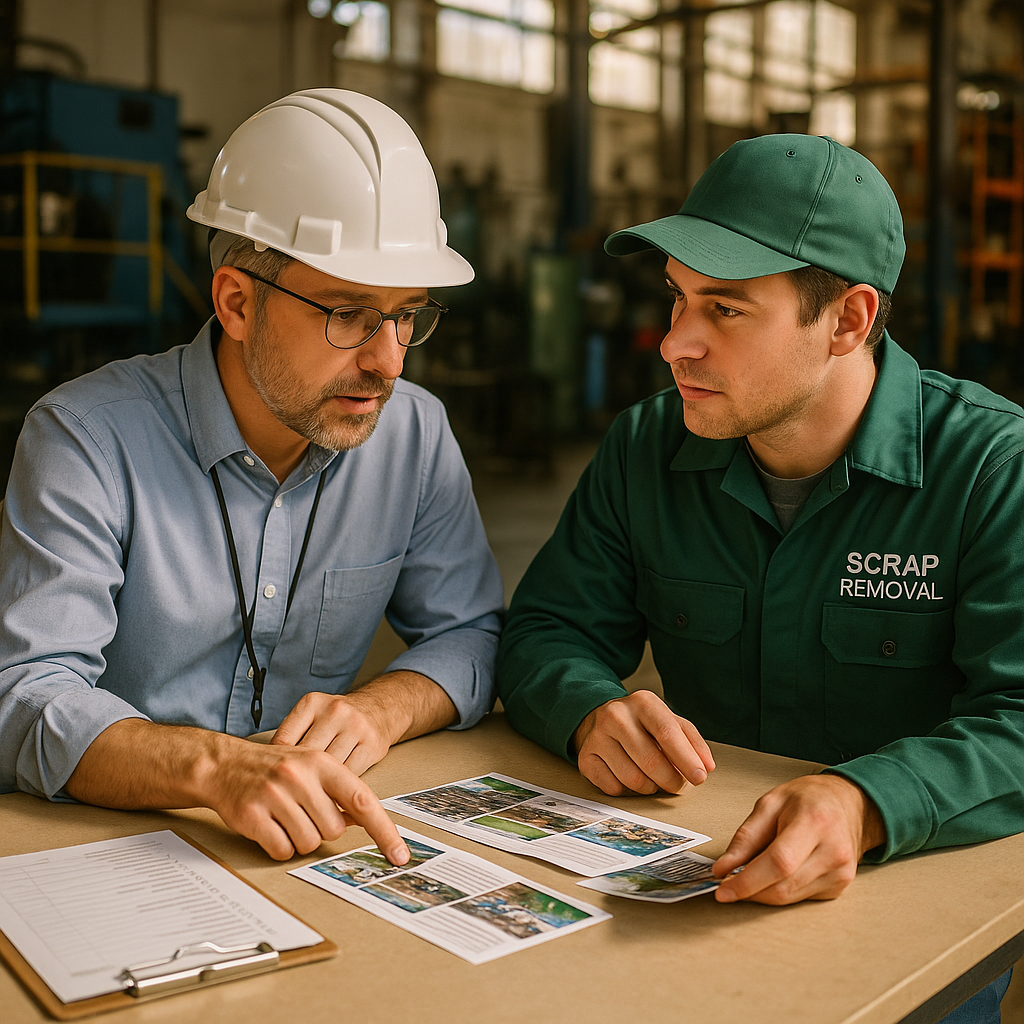5901 Botham Jean Blvd, Dallas, TX 75215
Factory Scrap Removal: Services, Benefits, and Recycling Strategies for Manufacturers
September 4, 2025Factory scrap removal involves systematically collecting, sorting, and recycling unused metal materials and decommissioned equipment from manufacturing facilities. It is a key aspect of industrial waste management that allows facilities to maintain efficiency while reducing their environmental impact. Factory scrap removal essentially turns potential waste into valuable resources that can be reintegrated into the manufacturing cycle.
Manufacturing operations generate various types of scrap daily, ranging from metal shavings and cutoffs to obsolete machinery and production rejects. Without proper removal systems, these materials can quickly pile up, posing safety hazards, consuming valuable floor space, and increasing disposal costs. Effective scrap removal mitigates these issues by establishing organized collection points, implementing sorting protocols, and collaborating with recycling facilities.
The benefits of proper factory scrap removal extend beyond mere waste reduction. By recycling industrial metals, manufacturers can significantly lower raw material costs, reduce energy consumption, and decrease greenhouse gas emissions. In today’s competitive manufacturing landscape, efficient scrap removal has shifted from being solely an environmental concern to a strategic business practice that directly impacts the bottom line.
What Services are Included in Factory Scrap Removal?
Factory scrap removal services cover a wide range of operations designed to manage industrial waste efficiently. These services meet the complex needs of manufacturing facilities looking to dispose of obsolete equipment and excess materials responsibly.
On-Site Assessment and Management
Professional scrap removal begins with a thorough on-site evaluation. This includes certified weighing of materials using calibrated scales to ensure accurate measurement and fair compensation. Quality inspection follows, with technicians examining materials for hazards and sorting capabilities.
Providers also handle storage logistics, offering temporary containment solutions while materials await processing. This often involves strategically placing containers throughout the facility to collect scrap at the point of generation. The loading process uses specialized equipment to safely transfer materials to transport vehicles.
Material Processing Services
The core of factory scrap removal involves various processing techniques adapted to different material types. Dismantling services break down complex machinery into manageable components. Decommissioning ensures that equipment is properly shut down and disconnected from power sources before removal.
Physical processing includes crushing bulky items to reduce volume, lancing to separate joined materials, baling to compress loose scrap, and shearing to cut large metal sheets into smaller pieces. These methods prepare materials for efficient transport and recycling.
Radiation testing is another critical service that screens for radioactive contamination in metal scraps. This safety measure protects workers and prevents hazardous materials from entering the recycling stream.
Transportation and Logistics
Removing factory scrap requires substantial logistics planning. Service providers maintain fleets of specialized vehicles, including trucks, railcars, and sometimes cargo ships, for transporting materials from the factory to recycling facilities.
For oversized items like heavy machinery, construction equipment, or intermodal containers, companies deploy specialized lifting and hauling equipment. This alleviates transportation concerns for clients with particularly large or unwieldy scrap items.
Many providers also offer container placement services, supplying bins, boxes, or trailers positioned strategically throughout the facility to streamline the collection process.
Mobile Processing Solutions
A growing trend in factory scrap removal is mobile processing. Instead of transporting bulky scrap to distant facilities, service providers bring portable equipment directly to the client’s location. These mobile units can perform various processing functions on-site, including crushing, baling, and shearing.
Mobile processing offers significant benefits by reducing transportation costs and minimizing the environmental impact associated with hauling heavy materials over long distances. This approach is particularly valuable for facilities in remote locations or those dealing with extremely heavy scrap materials.
Administrative and Compliance Services
Beyond physical removal, scrap management companies handle important administrative tasks. They obtain necessary permits and licenses for transport and processing. Many provide documentation of proper disposal, which is crucial for regulatory compliance.
Some companies offer real-time tracking systems where clients can monitor the status of their scrap materials throughout the removal process. This transparency helps businesses maintain oversight of their waste management programs.
How Does Professional Factory Scrap Removal Benefit Businesses?

Professional factory scrap removal significantly benefits businesses by optimizing operations and cutting costs. Companies in manufacturing, construction, and industrial sectors can turn what was once waste into a valuable resource with proper scrap management. Here are the key advantages of partnering with professional scrap removal services.
Cost Reduction and Revenue Generation
A primary advantage of professional factory scrap removal is its financial impact. Businesses can lower waste disposal costs by diverting scrap metal from landfills. Regular waste management services charge high fees for industrial waste, making specialized scrap removal a cost-effective choice.
Scrap metal also becomes a revenue source. Materials like copper, aluminum, steel, and brass hold substantial market value. A manufacturing facility that efficiently sorts and recycles scrap can generate considerable additional revenue annually. This leads to a dual financial benefit: reduced disposal costs and new income streams.
Enhanced Operational Efficiency
Professional scrap removal services streamline operations by clearing clutter and optimizing workspace. Many factories report increased production efficiency after implementing organized scrap management systems. When scrap accumulates, it creates bottlenecks that slow down processes and reduce productivity.
These services allow businesses to focus on core operations. Instead of dedicating employee time to sorting and transporting scrap, companies rely on specialists for collection, processing, and transportation. This specialization results in better sorting practices, higher recycling rates, and more efficient operations.
Safety Improvements
Safety is another critical benefit of professional scrap removal. Accumulated scrap poses workplace hazards like sharp edges, tripping risks, and fire dangers. Proper removal systems reduce these risks by establishing regular collection schedules and appropriate containment solutions.
Professionals have the equipment and training to manage potentially dangerous materials, reducing workplace accidents and associated costs like compensation claims, lost productivity, and regulatory fines. Companies prioritizing safety through professional scrap management typically report fewer workplace incidents.
Environmental Compliance and Sustainability
Environmental regulations for industrial waste are becoming stricter. Professional scrap removal services help businesses comply with these complex requirements, handling necessary documentation and disposal methods, and maintaining records for regulatory agencies.
Recycling scrap metal significantly reduces environmental impact compared to producing virgin metal. For example, recycling aluminum saves up to 95% of the energy needed for new aluminum production. This conservation translates directly into reduced carbon emissions and a smaller environmental footprint for businesses involved.
| Metal Type | Energy Savings (%) |
| Aluminum | 95% |
| Copper | 85% |
| Steel | 72% |
Logistical Expertise and Support
Scrap removal poses logistical challenges, which professional services address with infrastructure, transportation, and processing capabilities. They provide customized collection schedules, on-site containers, and solutions tailored to specific business needs.
These services also handle the administrative side of scrap management, obtaining permits, maintaining licenses, and ensuring regulatory compliance. This eliminates the need for businesses to navigate complex frameworks or invest in specialized equipment and training.
Brand Enhancement and Competitive Advantage
Consumers and business partners today increasingly value companies with environmental responsibility. Professional scrap removal helps build sustainability credentials, enhancing brand reputation and offering competitive differentiation.
Many businesses find that sustainability initiatives, such as scrap metal recycling, become key selling points with environmentally conscious customers and partners, offering benefits beyond direct operational advantages.
What Types of Scrap Materials are Commonly Removed from Factories?

Factory operations generate substantial amounts of scrap materials during manufacturing processes. Proper removal and processing of these materials are crucial to minimize environmental impact and recover valuable resources. Understanding the various types of factory scrap is essential for implementing effective recycling strategies.
Ferrous Metals
Ferrous metals contain iron and can be identified using a simple magnet test. If the magnet sticks, you’re dealing with ferrous metal. These materials make up a significant portion of factory scrap.
Common ferrous scrap materials from factories include steel components, iron casings, and heavy melting steel from industrial equipment. Steel is among the most recycled materials worldwide due to its sustainable properties and the fact that it retains its characteristics during recycling.
Factories typically produce various forms of ferrous scrap such as:
- Structural steel from building components and frameworks
- Cast iron from machinery bases, engine blocks, and industrial piping
- Sheet metal offcuts from manufacturing processes
- Machine turnings and borings from metal fabrication
- Industrial springs, fasteners, and hardware
Non-Ferrous Metals
Non-ferrous metals don’t contain iron and won’t stick to magnets. These materials often command higher prices at recycling facilities due to their value and specialized properties.
Factories regularly discard valuable non-ferrous metals including:
- Aluminum from equipment casings, manufacturing components, and structural elements
- Copper from electrical wiring, motors, and plumbing systems
- Brass from valves, fittings, and decorative elements
- Bronze from bearings, bushings, and specialized components
- Stainless steel from food processing equipment, chemical tanks, and precision parts
Non-ferrous metals are particularly valuable in recycling because they resist corrosion, offer excellent conductivity, and maintain their properties through multiple recycling cycles.
Electronic Waste (E-Waste)
Modern factories rely heavily on electronic equipment that eventually becomes obsolete or fails. This electronic waste contains various metals and materials requiring specialized handling during recycling.
Common factory e-waste includes:
- Control panels and industrial computers
- Programmable logic controllers (PLCs) and automation equipment
- Electric motors and variable frequency drives
- Circuit boards and electronic components
- Monitoring equipment and sensors
- Industrial display screens and interfaces
Proper e-waste recycling is crucial as these items often contain valuable materials like gold, silver, and copper as well as potentially hazardous substances requiring careful handling.
Specialized Alloys
Manufacturing facilities working with advanced materials often generate scrap from specialized alloys. These high-performance materials contain specific combinations of metals engineered for particular applications.
Examples of specialized alloy scrap from factories include:
- Inconel (nickel-chromium-based superalloys) from high-temperature applications
- Monel (nickel-copper alloys) from chemical processing equipment
- Titanium from aerospace and medical device manufacturing
- Hastelloy from corrosion-resistant equipment
- Tool steels from cutting and forming operations
These specialized materials often require advanced sorting technologies to identify and separate them from other scrap streams accurately.
Industrial Equipment and Machinery
When factories upgrade or decommission equipment, entire machines or substantial components enter the scrap stream. These items typically contain multiple material types that require separation during recycling.
Industrial equipment scrap commonly includes:
- Outdated manufacturing machinery
- Forklifts and material handling equipment
- Generators and power distribution components
- Industrial pumps and compressors
- Heat exchangers and industrial cooling systems
- Conveyors and production line equipment
Many of these items contain valuable recoverable materials like copper windings in motors, steel frames, and aluminum components that can be recycled into new products.
Other Factory Scrap Materials
Beyond metals and electronics, factories generate various other scrap materials requiring proper handling and recycling.
Additional factory scrap materials include:
- Construction and demolition debris from facility modifications
- Catalytic converters from industrial vehicles and equipment
- Industrial batteries and energy storage systems
- Plastic components and packaging materials
- Wood pallets and shipping materials
- Glass from industrial processes and facility renovations
Each of these materials presents unique recycling challenges and opportunities, requiring specialized handling to maximize resource recovery.
| Category | Scrap Material | Common Sources | Recycling Value |
|---|---|---|---|
| Ferrous Metals | Steel | Building components, structural steel | Moderate |
| Cast Iron | Machinery bases, engine blocks | Moderate | |
| Non-Ferrous Metals | Aluminum | Equipment casings, structural elements | High |
| Copper | Electrical wiring, plumbing systems | Very High | |
| Brass | Valves, fittings | High | |
| Electronic Waste | Control Panels | Industrial computers, PLCs | Variable |
| Specialized Alloys | Titanium | Aerospace, medical devices | Very High |
| Industrial Equipment | Machines | Outdated manufacturing machinery | Variable |
The proper identification and separation of these various scrap materials are essential for efficient recycling. Many factories now implement comprehensive scrap management programs that sort materials at the source, maximizing their value and simplifying the recycling process. By understanding the types of scrap materials commonly generated, factory operators can develop more effective waste management strategies and potentially create additional revenue streams from what would otherwise be considered waste.
How to Choose the Right Factory Scrap Removal Service?
Evaluate Industry Experience and Reputation
When selecting a factory scrap removal service, begin by examining their industry experience. Companies with a proven track record typically provide more reliable service. Check customer reviews and case studies, and ask for references from businesses similar to yours.
Look for providers affiliated with professional organizations like the Institute of Scrap Recycling Industries (ISRI). This affiliation signals a commitment to industry standards and best practices. Companies with long-standing operations in your region often have established networks and a deeper understanding of local regulations.
Assess Service Capabilities and Material Handling
The right scrap removal partner should be equipped to handle your specific types of materials. Different manufacturing processes generate various scrap metals, from ferrous to non-ferrous, each requiring appropriate handling methods.
Request information about their sorting capabilities and whether they can collaborate with your team to properly grade your scrap to maximize material value. The best providers offer comprehensive convenience through services like regular pickup schedules, container provision, and flexible collection options that minimize disruption to your operations.
Verify Environmental Compliance
Environmental responsibility should be a priority when choosing a scrap removal service. Verify that potential providers comply with EPA regulations and follow proper protocols for handling potentially hazardous materials.
Ask candidates about their environmental practices, recycling rates, and waste reduction initiatives. Reputable companies will readily share their environmental policies and certifications. This transparency not only ensures compliance but also aligns with sustainability goals that increasingly matter to stakeholders and customers.
Compare Pricing Structure and Payment Terms
Transparent pricing is essential in selecting the right service provider. Request detailed information about how they determine scrap value and what factors might affect pricing. Be cautious of vague quotes or providers unwilling to explain their pricing methodology.
Understand their payment terms, including payment methods, timing, and any potential fees. Some providers offer more competitive rates for long-term contracts or larger volumes. Remember that while price matters, it shouldn’t be your only consideration—reliable service and proper compliance often justify premium rates.
Evaluate Logistics and Operational Capabilities
The right provider should offer logistics solutions tailored to your facility’s needs. Consider their transportation fleet, container options, and scheduling flexibility. Ask about their ability to handle peak periods or unexpected volume increases.
Some providers offer on-site processing services that can significantly reduce handling and transportation costs. Assess whether their operational hours align with your production schedule and if they provide emergency pickup services when needed.
Review Documentation and Reporting Practices
Proper documentation is crucial for regulatory compliance and internal record-keeping. The provider should offer comprehensive reporting that tracks material types, weights, and transaction details.
Ask about their ability to provide certificates of recycling or destruction when required. Advanced providers may offer digital tracking systems that provide real-time visibility into your scrap management program, helping you measure environmental impact and identify potential cost savings.
| Factor | Description |
|---|---|
| Industry Experience and Reputation | Evaluate the company’s track record, customer reviews, and memberships in professional organizations like ISRI. |
| Service Capabilities and Material Handling | Ensure they can handle your specific materials and offer services like regular pickups and container provision. |
| Environmental Compliance | Verify compliance with EPA regulations and check their recycling rates and sustainability initiatives. |
| Pricing Structure and Payment Terms | Look for transparent pricing and understand their payment terms, including any potential fees and contract advantages. |
| Logistics and Operational Capabilities | Assess transportation fleet, container options, and flexibility in scheduling and handling volumes. |
| Documentation and Reporting Practices | The capability to provide comprehensive reporting and certificates of recycling or destruction. |
| Long-term Partnership Potential | Consider if the provider shows interest in understanding your business operations and offering value-added services. |
Consider Long-term Partnership Potential
The best scrap removal relationships evolve into strategic partnerships that benefit both parties. Evaluate whether potential providers show interest in understanding your business operations and offering solutions beyond basic collection.
Look for companies willing to conduct waste audits or suggest process improvements that could reduce scrap generation or increase recovery value. These value-added services indicate a partner committed to your success rather than just a transactional vendor.
Conclusion: Optimizing Factory Operations Through Effective Scrap Removal

Effective scrap removal is essential for modern industrial operations. Factories that implement efficient waste management systems not only lessen their environmental impact but also enhance operational efficiency. The benefits go beyond basic waste disposal, contributing to cleaner workspaces, improved safety, and better workflow processes.
As sustainability becomes increasingly vital across industries, proper scrap management remains a key component of responsible manufacturing. For assistance with your factory’s recycling and scrap removal needs, contact Okon Recycling at 214-717-4083. Our team can help you implement sustainable scrap management solutions that align with your operational goals while supporting environmental best practices.
